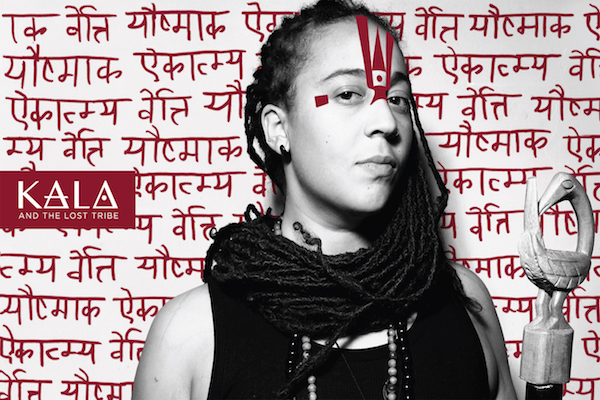Arianna “Kala” Brame is a multi-instrumentalist, composer, producer, poet and MC based in Brooklyn, NY. Trained in classical and jazz piano at Westminster Conservatory and Sarah Lawrence College, Kala is also a student of percussion, West African and Afro Latin drumming. Kala and The Lost Tribe has performed in New York City at many venues including Baby’s Alright, The Bowery Electric, National Sawdust, le Poisson Rouge, and had the esteemed honor of playing Blue Note’s Late Night Groove Series.
The Lost Tribe is the host of ancestors and spirit allies that walk with and guide us—artistically and practically—in day-to-day life. To honor The Lost Tribe is to acknowledge, invoke, and celebrate ancestral presence and support. In numerous cosmologies from around the world, it is believed that these pantheons of deities are our ancestors, once living members of our communities. With this awareness, we – living ancestors of future generations- are also members of The Lost Tribe. May we remember the shoulders we stand on, the responsibility we have as individuals in our communities, and the cycle we will fulfill in the future when it is our turn and privilege to give back to those who have inherited our legacy.
How long have you been creating your art?
I’ve been playing piano since I was six and started recording my own tunes on a tape recorder a couple years later.
Where are you from? How does that influence your art?
I’m from Trenton, NJ, and currently live in Brooklyn, NY. Living in NYC gives me the push I need to pursue my craft at a high caliber.
What are you currently working on or recently finished?
The Art of Balance EP dropped on September 27, 2018. The EP is a timeless offering that is both personal and culturally affirming.
What is your inspiration? And, why?
I’m inspired to tell my story, in my voice, in my words and obviously, it wasn’t being told because it was mine. However, I was driven by the fact that stories and voices like mine are incredibly marginalized in both mainstream and underground Hip-Hop. My goal is to tell my story authentically while also leaving lots of room for like-minded and like-spirited individuals to see themselves in my work and be inspired and moved by it.
What do you hope to achieve as an artist?
I want to travel the world, playing live and making a handsome living off it. I want to collaborate with other artists on similar wavelengths and have the time and energy to let the juices flow. I’d like to continue my teaching work and hope to open an Alvin Ailey type school but with interdisciplinary arts.
How would you describe your experience in the music industry?
I’ve encountered a lot of machismo as a female and masculine presenting bandleader, producer, composer, multi-instrumentalist, and MC. Lots of patronizing, over-explaining and second guessing of my decisions and desires.
Did music play an integral role in your coming out? If yes, how so?
No. However, Erykah Badu’s “Baduism Live” album was playing the first time I was with a woman in college.
Given challenges facing our country and community, in your opinion, what is most needed for the queer community now? How can the music scene advance that goal?
In short, be yourself unapologetically and be safe. As far as the music industry, offer various representations of queer identity other than tropes that uphold the same oppressive narratives and actions.
Top 3 Major Influences.
Lauryn Hill (The Fugees), Black Starr (Talib and Mos), and John Coltrane.
Finish: Art is….
Unapologetic.
You can find LiKWUiD and other queer artists at the Womxn Fuck Shit Up Festival (WFSU) on April 20, in Washington, D.C.

